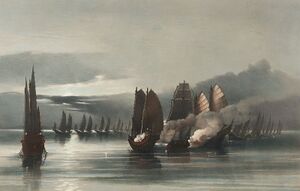Auro-Quenminese War: Difference between revisions
BattlerNonna (talk | contribs) mNo edit summary |
BattlerNonna (talk | contribs) (Added another Quenminese name for the war, which uses the sexagenary cycle system.) |
||
| Line 75: | Line 75: | ||
| campaignbox = {{Auro-Quenminese War - Quenminese Theater}} {{Auro-Quenminese War - South Lorican Sea Theater}} {{Auro-Quenminese War - Bactieu and East Indies Theater}} {{Theaters of the Sandoric Wars}} | | campaignbox = {{Auro-Quenminese War - Quenminese Theater}} {{Auro-Quenminese War - South Lorican Sea Theater}} {{Auro-Quenminese War - Bactieu and East Indies Theater}} {{Theaters of the Sandoric Wars}} | ||
}} | }} | ||
The '''Auro-Quenminese War''', also known as the '''Aurucolian War''' by the [[Quenmin]]ese, was a military conflict that pitted the [[Lận Dynasty]] and the [[Sandoric Aurucolia|Aurucolian Empire]]. The war formed another theater of the [[Sandoric Wars]], with battles going as far as the Hindalesian islands and the Formosa Strait. The conflict was an attempt for Aurucolian economic supremacy in Southeast Asianna. | The '''Auro-Quenminese War''', also known as the '''Aurucolian War''' and the '''Tân Mùi War''' by the [[Quenmin]]ese, was a military conflict that pitted the [[Lận Dynasty]] and the [[Sandoric Aurucolia|Aurucolian Empire]]. The war formed another theater of the [[Sandoric Wars]], with battles going as far as the Hindalesian islands and the Formosa Strait. The conflict was an attempt for Aurucolian economic supremacy in Southeast Asianna. | ||
The conflict began with the [[Raid at Hoi An]], where [[Renátó Orsós]], commander of the [[Aurucolian East Indiae Company]] contingent in Southeast Asianna, raided the governor's house and burned and looted half of the city, including murdering employees of the [[Imperial East Indiae Company]]. Hearing of the news, Emperor [[Sùng Khang]] issued a call to arms to expel Aurucolian presence. | The conflict began with the [[Raid at Hoi An]], where [[Renátó Orsós]], commander of the [[Aurucolian East Indiae Company]] contingent in Southeast Asianna, raided the governor's house and burned and looted half of the city, including murdering employees of the [[Imperial East Indiae Company]]. Hearing of the news, Emperor [[Sùng Khang]] issued a call to arms to expel Aurucolian presence. | ||
Latest revision as of 00:50, 28 February 2021
The Auro-Quenminese War, also known as the Aurucolian War and the Tân Mùi War by the Quenminese, was a military conflict that pitted the Lận Dynasty and the Aurucolian Empire. The war formed another theater of the Sandoric Wars, with battles going as far as the Hindalesian islands and the Formosa Strait. The conflict was an attempt for Aurucolian economic supremacy in Southeast Asianna.
The conflict began with the Raid at Hoi An, where Renátó Orsós, commander of the Aurucolian East Indiae Company contingent in Southeast Asianna, raided the governor's house and burned and looted half of the city, including murdering employees of the Imperial East Indiae Company. Hearing of the news, Emperor Sùng Khang issued a call to arms to expel Aurucolian presence.
As Sandor I abdicated from the Aurucolian throne, the Aurucolians withdrew troops from Quenmin and Bactieu despite the wish of Lord Triệu Ninh. However, the Aurucolians agreed to provide limited support to prolong their civil war against the Imperial Quenminese government.
Background
Course of the war
Quenminese front
Bactieu and East Indies
Sarkoros and Formosa
The battles fought near Sarkoros and Formosa were mostly naval.
